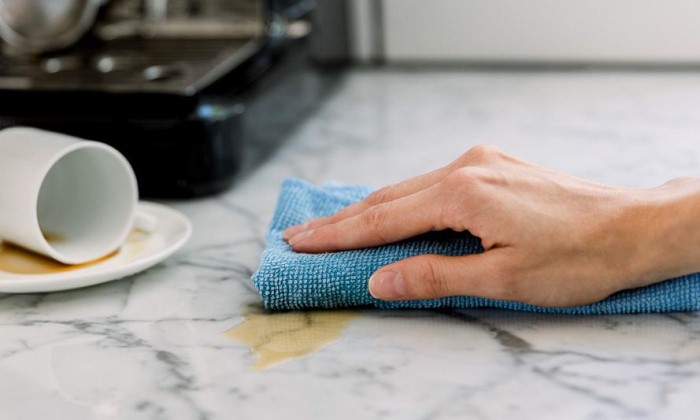While marble is not very delicate, it is susceptible to staining and etching caused by abrasive cleaners. You can prevent stains and damage by regularly cleaning the stone. One way to avoid stains is by making a poultice of baking soda and water on the stain. If you’re unsure of what products to use, read this article. It will give you some helpful tips on how to clean marble countertops.
Contents
Avoid cleaning products that can etch the stone surface
You should avoid using regular cleaning products to clean your stone surfaces, including bleach, ammonia, citrus foods, and vinegar. Acidic liquids will cause scratches and etching and are not covered under warranty. However, if etching does occur, you can treat the stain by using a neutral stone surface cleaner. But, be sure to store vinegar in a locked cabinet. If you are unsure how to properly clean your stone countertops, ask a professional.
The chemical agents in skin soaps react with the sensitive minerals in stone to create an etched surface. The stone may need to be honed and refinished if the etching is deep. However, a professional stone restoration technician can attempt to remove mild etching by applying polishing powder, but deeper etching is more difficult to remove. The white spot on the glass is an example of an alkaline etch mark, which occurs from the regular use of high-alkaline soaps.
Avoid abrasive cleaners
When you are cleaning marble, you need to choose the right kind of cleaner. You need to use a cleaner that is safe for the material so that you can keep the marble looking new. The first thing that you need to consider when cleaning marble is the stain. If it is organic, you should apply a solution of 12% hydrogen peroxide and ammonia to the stain. However, if the stain is oil-based, you should apply mineral spirits or acetone and rinse it off.
While most common household cleaners are effective at cleaning other surfaces, they are not suitable for marble. Even brand-name cleaners can damage the surface. Choosing cheap surface cleaners may not be a good idea since they could damage the finish. You may end up paying more money for marble maintenance or restoration because you used caustic and acidic cleaners that could damage the stone’s finish.
Prevent stains with regular cleanings
Marble surfaces can easily be stained, so you should take special care to keep them clean and sealed. It’s also important to be gentle around them. If you do accidentally spill something acidic on them, make sure to clean them as soon as possible. You can also use steel wool to buff out dull spots. Deep scratches may require professional sanding. Before beginning cleaning, you should check the manufacturer’s guidelines to find out how to properly clean your countertops. Generally, polished marble doesn’t need to be sealed. If your countertops are made of honed marble, however, you may want to check the manufacturer’s suggestions.
To clean the marble surfaces, you can use mild detergents or a paste-like cleaning agent. You can also try using ammonia or peroxide to remove organic stains. If the stains aren’t permanent, you can always apply a sealant or resand the countertops with a diamond-bladed metal tool to restore their luster. For tougher stains, you can try 12% peroxide bleach or water.
Use a baking soda poultice
If your marble countertop has a stain, you can try applying a poultice of baking soda to the area. You can also use ammonia or 12% hydrogen peroxide. This mixture will help to loosen the stain. Mix the ingredients and spread the mixture over the stain. Allow the poultice to sit for 24 hours. You can then remove it with distilled water or a plastic spatula. You may also wish to use a polishing powder and a felt buffing pad.
When applying a poultice on marble, you should be very careful and make sure that it is not too dry. The consistency of the solution should be like peanut butter or cake icing. Make sure that you wet the surface with mineral water before applying the poultice. Make sure the marble cleaner is dampened before applying the poultice. If the marble is wet, you should use a separate cloth to wipe it off.
Avoid acidic cleaners
When cleaning marble countertops, it is best to use a neutral-pH soap and warm water. However, you should be careful to avoid using harsh scrubbing pads or acidic cleaners, as these can etch the marble and leave it dull and unattractive. To protect your marble countertops, use cutting boards or bowls that are free of acid. To prevent staining, avoid using soap or acidic cleaners altogether.
For everyday messes and stains, use an alkaline cleaning solution. You can also use mineral oil or acetate to remove oil-based stains. For stains made from organic substances, use a solution of 12% peroxide bleach. If you do find an organic stain, you should try a cleaner made with lacquer thinner, which will remove any caked-on debris. If a spill is too stubborn, you can use a flat scraper to lift it.

